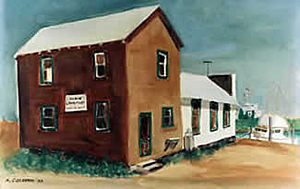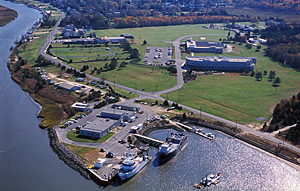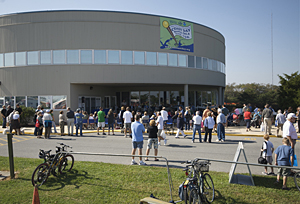


ADVERTISEMENT
- Rozovsky wins prestigious NSF Early Career Award
- UD students meet alumni, experience 'closing bell' at NYSE
- Newark Police seek assistance in identifying suspects in robbery
- Rivlin says bipartisan budget action, stronger budget rules key to reversing debt
- Stink bugs shouldn't pose problem until late summer
- Gao to honor Placido Domingo in Washington performance
- Adopt-A-Highway project keeps Lewes road clean
- WVUD's Radiothon fundraiser runs April 1-10
- W.D. Snodgrass Symposium to honor Pulitzer winner
- New guide helps cancer patients manage symptoms
- UD in the News, March 25, 2011
- For the Record, March 25, 2011
- Public opinion expert discusses world views of U.S. in Global Agenda series
- Congressional delegation, dean laud Center for Community Research and Service program
- Center for Political Communication sets symposium on politics, entertainment
- Students work to raise funds, awareness of domestic violence
- Equestrian team wins regional championship in Western riding
- Markell, Harker stress importance of agriculture to Delaware's economy
- Carol A. Ammon MBA Case Competition winners announced
- Prof presents blood-clotting studies at Gordon Research Conference
- Sexual Assault Awareness Month events, programs announced
- Stay connected with Sea Grant, CEOE e-newsletter
- A message to UD regarding the tragedy in Japan
- More News >>
- March 31-May 14: REP stages Neil Simon's 'The Good Doctor'
- April 2: Newark plans annual 'wine and dine'
- April 5: Expert perspective on U.S. health care
- April 5: Comedian Ace Guillen to visit Scrounge
- April 6, May 4: School of Nursing sponsors research lecture series
- April 6-May 4: Confucius Institute presents Chinese Film Series on Wednesdays
- April 6: IPCC's Pachauri to discuss sustainable development in DENIN Dialogue Series
- April 7: 'WVUDstock' radiothon concert announced
- April 8: English Language Institute presents 'Arts in Translation'
- April 9: Green and Healthy Living Expo planned at The Bob
- April 9: Center for Political Communication to host Onion editor
- April 10: Alumni Easter Egg-stravaganza planned
- April 11: CDS session to focus on visual assistive technologies
- April 12: T.J. Stiles to speak at UDLA annual dinner
- April 15, 16: Annual UD push lawnmower tune-up scheduled
- April 15, 16: Master Players series presents iMusic 4, China Magpie
- April 15, 16: Delaware Symphony, UD chorus to perform Mahler work
- April 18: Former NFL Coach Bill Cowher featured in UD Speaks
- April 21-24: Sesame Street Live brings Elmo and friends to The Bob
- April 30: Save the date for Ag Day 2011 at UD
- April 30: Symposium to consider 'Frontiers at the Chemistry-Biology Interface'
- April 30-May 1: Relay for Life set at Delaware Field House
- May 4: Delaware Membrane Protein Symposium announced
- May 5: Northwestern University's Leon Keer to deliver Kerr lecture
- May 7: Women's volleyball team to host second annual Spring Fling
- Through May 3: SPPA announces speakers for 10th annual lecture series
- Through May 4: Global Agenda sees U.S. through others' eyes; World Bank president to speak
- Through May 4: 'Research on Race, Ethnicity, Culture' topic of series
- Through May 9: Black American Studies announces lecture series
- Through May 11: 'Challenges in Jewish Culture' lecture series announced
- Through May 11: Area Studies research featured in speaker series
- Through June 5: 'Andy Warhol: Behind the Camera' on view in Old College Gallery
- Through July 15: 'Bodyscapes' on view at Mechanical Hall Gallery
- More What's Happening >>
- UD calendar >>
- Middle States evaluation team on campus April 5
- Phipps named HR Liaison of the Quarter
- Senior wins iPad for participating in assessment study
- April 19: Procurement Services schedules information sessions
- UD Bookstore announces spring break hours
- HealthyU Wellness Program encourages employees to 'Step into Spring'
- April 8-29: Faculty roundtable series considers student engagement
- GRE is changing; learn more at April 15 info session
- April 30: UD Evening with Blue Rocks set for employees
- Morris Library to be open 24/7 during final exams
- More Campus FYI >>
2:55 p.m., June 8, 2010----June 6 marked the 40th anniversary of the founding of what today is the College of Earth, Ocean, and Environment (CEOE) at the University of Delaware. Originally with roots in marine studies, the college has expanded its research and teaching expertise over four decades to include the full realm of earth, ocean, and atmospheric systems.
The foundation for today's CEOE began in the late 1940s with a significant decline in menhaden stocks in the Delaware Estuary. Recognizing the University's potential to help determine the cause of this decline, the state allocated funds to establish a marine biology program at UD.
Over time, programs in aquaculture, marine geology, and ocean engineering also emerged at the university. To unite these marine research programs, the UD Board of Trustees created the interdisciplinary Graduate College of Marine Studies.
The college's founders had a unique vision of an interdisciplinary marine institution that would include all aspects of human interaction with the sea. As a college of marine studies, it would move beyond just scientific examination to also include the political, social, and economic dimensions of the marine environment.
At a time when most marine programs were highly stratified by discipline, this novel approach catapulted the University of Delaware to the forefront of marine education.
The college's prominence was strengthened by two more actions in those early years. In 1974, the University broke ground for the first building at its marine studies complex in Lewes. The campus quickly provided researchers with state-of-the-art facilities and ready access to Delaware's coastal and marine ecosystems.
Two years later, the University became the nation's ninth Sea Grant College. This designation reflected the university's growing importance as a center for marine research.
Today, Delaware Sea Grant is part of a national network of 32 university-based programs working to foster the wise use, conservation, and management of marine resources.
The college has grown considerably since those early years. The addition of the Department of Geological Sciences in 2006 broadened its scope and resulted in a name change to the College of Marine and Earth Studies. This change also marked the first time that undergraduate majors became part of the college's academic tradition.
A second merger took place in 2009, when the college joined with UD's Department of Geography to form the College of Earth, Ocean, and Environment.
At that time, Dean Nancy Targett explained, “We have clustered units that share expertise in policy, science, and the human environment. In doing so, we are accentuating the already strong foundation that UD has in the areas of earth and ocean studies.”
The 2009 reorganization gave the college its current structure of two departments -- geological sciences and geography -- and a School of Marine Science and Policy.
In addition to Delaware Sea Grant, CEOE houses the Delaware Geological Survey -- part of a national network that conducts geologic and hydrologic research -- and the Delaware Environmental Observing System, which plays a critical role in emergency management, natural resource monitoring, and transportation across the region.
The college is also the administrative base of several research centers, the Scientific Committee on Oceanic Research, and the Joint Institute for Coastal Research and Management -- a partnership with China's Xiamen University.
From its humble early days founded in fisheries to new research opportunities in alternative energies, CEOE continues to foster cutting-edge work that is opening up important new areas of study, responsibility, and, perhaps most importantly, opportunity.
For more about the College of Earth, Ocean, and Environment, visit the college's website.
Oct. 2: Save the date
Save the date for the college's 40th anniversary celebration picnic and softball game to be held Saturday, Oct. 2, in Lewes. Contact Claire Birney at [cabirney@udel.edu] or (302) 831-2169 with questions or to be added to the event mailing list.
Article by Elizabeth Boyle
Images courtesy of CEOE


